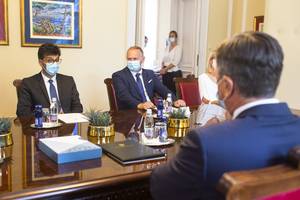Peter Svetina, the Human Rights Ombudsman of the Republic of Slovenia, and his colleagues today presented to Borut Pahor, the President of the Republic of Slovenia, the Annual Report of the Human Rights Ombudsman for 2020 and the Report of the Human Rights Ombudsman of the Republic of Slovenia on Implementation of the Tasks of the National Preventive Mechanism under the Optional Protocol to the Convention against Torture and Other Cruel, Inhuman or Degrading Treatment or Punishment for 2020.
On this occasion, the President of Slovenia and the Ombudsman discussed key issues regarding the human rights situation in Slovenia. This area has been strongly marked by the COVID-19 pandemic as well, as the Ombudsman received a third more initiatives than in previous years. Violations of human rights or fundamental freedoms were detected in about 500 cases.
The Ombudsman was in regular contact with the responsible institutions from various branches of power, recalling the importance of respecting international and constitutional human rights standards. He assessed as positive the fact that the Government responded to the great majority of the Ombudsman's initiatives, opinions and proposals, while the response of individual ministries to proposals was unfortunately still insufficient.
At the same time, the Ombudsman pointed out that the epidemic has particularly exposed and deepened the problems in the protection and implementation of human rights in areas where they did not receive adequate attention for many years. This especially concerns care for particularly vulnerable groups such as the elderly, people with mental development disorders and the homeless, who are even more dependent on state measures in the present circumstances. The Ombudsman pointed out in particular the lack of attention and action of local communities, as dignity and the protection of human rights always begin with appropriate care in the local environment. The Ombudsman’s office also identified great difficulties in the provision of basic health care and access to family doctors.
The President of Slovenia thanked the Ombudsman and his colleagues for their cooperation, as they had several meetings on current issues regarding the implementation of human rights in Slovenia in the past year. He also thanked him for his successful work and transparent alerts as regards the situation in this field in Slovenia.
In his report, the Ombudsman recommends that the Government examine and explain in its response report the reasons why the recommendations made in previous years have not been implemented. The Government should also ensure that the competent authorities start to implement the unfulfilled recommendations effectively and cooperate with each other to this end, if necessary.
The activities of the office of the Ombudsman last year included the implementation of the duties and powers of the National Preventive Mechanism (NPM). Employees visited 51 places of detention and monitored two returns of foreigners. They visited 18 police stations, ten homes for the elderly, seven different locations of educational institutions, five prisons, five special social protection institutions, three psychiatric hospitals, detention facilities of the military police, a youth crisis centre and an occupational activity centre, as described in the Ombudsman's annual report, and also issued a report on the implementation of NPM tasks in 2020.
The NPM made a total of 329 recommendations, of which 163 have been implemented. 125 recommendations have been adopted but not yet implemented, 15 have not been adopted, and the rest are still awaiting a response.




